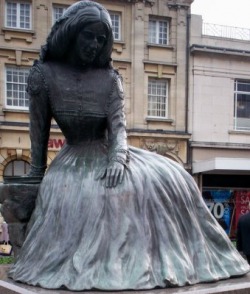George Eliot
The Young Life of Mary Anne
Born on November 22, 1819 in Warwickshire England, Mary Anne Evans was brought up in a hardworking, modest but successful English household. Her parents worked on an estate but held important roles in the estates agriculture. Her father (Robert Evans) drilled Evans with the importance of an education and she was raised with an effective and efficient work ethic and during her literary career her prominent education shown through her works with deep and intelligent references to historical, Greek and other literary sources. Since her family had access to the higher class Eliot was able to have a private tutor and education and was able to go to the library of Arbury Hall. She was able to have access to a wide variety of literature and was exposed to a great amount of knowledge at a very young age. But since she was also exposed to the lower class and those who lived in poverty, Eliot was able to understand the issues and differences between the class of English society, influencing her perspective of higher society both positively and negatively ( the benefits of belonging to upper class but also how the upper class negatively impacts the lower classes) .
Becoming "George Eliot"
Mary Anne Evans (George Eliot) was a successful novelist throughout her lifetime and produced numerous novels, poetry and various other works. She is notably compared to Jane Austin when referring to influencing movements in English Literature. During the Victorian Era, she primarily wrote about the networks and inner circles of English society and various fictional characters that portrayed the day to day life in England.
By taking on the pen name "George Eliot" Evans desired her published works and literary career to be judge by literary criticism and not polluted with the judgments of female writers at the time. Ultimately she wanted to be viewed solely as a writer/novelist and didn't want her works to be ignored because she was a women writer. Also, her private and romantic life was rumored to be a social disgrace, since she had an ongoing affair with a married man, George Henry Lewes (who later became her husband) and she did not want her social reputation to stain her literary career.
Eliots Reputation
Eliots literary career was a full and popular enterprise. Her first novel Adam Bede was incredibly popular and drew an overwhelming amount of public gossip trying to discover who this author was. A man by the name of Joseph Liggins attempted to gain popularity of writing the novel but Evans stepped forward to take her due credit.
As soon as she was given credit for writing Adam Bede, Evans worst fears became reality. The public became aware of her unorthodox marriage to Lewes. In the novels dedication Eliot writes,
"To my dear husband, George Henry Lewes, I give the manuscript of a work which would never have been written but for the happiness which his love has conferred on my life".
Since Lewes was scandalously still married to Agnes Jervis ( whom he had 3 children together and Jervis herself had many other children with numerous amounts of other men) Eliot and Lewes maintained a "marriage" but where not welcomed into polite society. Eliot's public reputation was a scandal but conveniently this did not cross over and hamper her literary career. In 1867 however, her public/societal reputation was raised to the popular magnitude of her literary reputation when Queen Victoria's daughter Louise invited Eliot and Lewes to an introduction ( basically inviting them back into high society) since Louise was a dedicated fan of Eliots novels.
Literary Career of George Eliot
Novels
Adam Bede (1859),The Mill on the Floss (1860), Silas Marner (1861), Romola (1863), Felix Holt, The Radical (1866), Middle March (1871-1872), Daniel Deronda (1876)
Favorite Poetry
The Spanish Gypsy (1868), Agatha (1869), Armgart (1871), Stradivarious (1873), The Legend of Jubal (1874), Arion (1874), A Minor Prophet (1874), The Death of Moses (1879)
Other Published Works
Scene of Cerical Life (1858), The Lifted Veil (1859), Brother Jacob (1864)
Eliots literary status and responses
Eliots goal as a novelist was to be taken seriously and not be "mixed in" with other women writers at the time. Eliot felt that women writers during her career focused on romances and womens trifles. This emphasizes why Eliot took such a masculine pen name, so her works would be critiqued solely on her literary performance and not her status as a female.
Adam Bede was an overwhelmingly popular novel in the Victorian Era and granted Eliot much praise from the literary world. Even her novels The Mill on the Floss ( Eliots most autobiographical novel which discusses religions impact on a young females psychological development) and The Lifted Veil ( another autobiographical inspired novel were Eliot reflects her status as a women and a novelist facing societal criticism), all of her novels were very popular and accepted by Victorian society, because they were smart and intellectual works. Near the end of her literary career Eliots popularity had fallen. Until she wrote Daniel Deronda in 1876, around the same time as the passing of Lewes she had become a more low key literary figure of the time. But her works were always well received by not only women of the Victorian era but a good amount of the male audience. She did not overwhelm the male critics ( since she was known as a female writer) but she did however pave the way for intellectual female writers. One notable fan who drew inspiration from Eliots works was Virginia Woolf who wrote George Eliot as a biography and critism of her works and life. Eliot beautifully wrote about religion, status of class in English society, ethics and was one of the first English novelists to move away from merely writing about the trifles of a woman's life and looked for the intellectual view of a females status and role in society.
In the End...
George Eliot left the literary world literary works that sensitively discussed various topics & issues in English society and culture. The role of the woman, the importance of respect for the lower and working class, religion in education & social upbringing and most importantly the day to day respect for oneself and others we encounter throughout life. As she suffered from low self respect and minimal confidence ( for she is described as UNbeautiful and plain) but what she lacked for beauty she made up with the beautiful thoughts and verses that she created for the world to enjoy long after she died.
"Indeed, one cannot escape the conviction that the long, heavy face with its expression of serious and sullen and almost equine power has stamped itself depressingly upon the minds of people who remember George Eliot, so that it looks out upon them from her pages".- Virginia Woolf ,"George Eliot".


